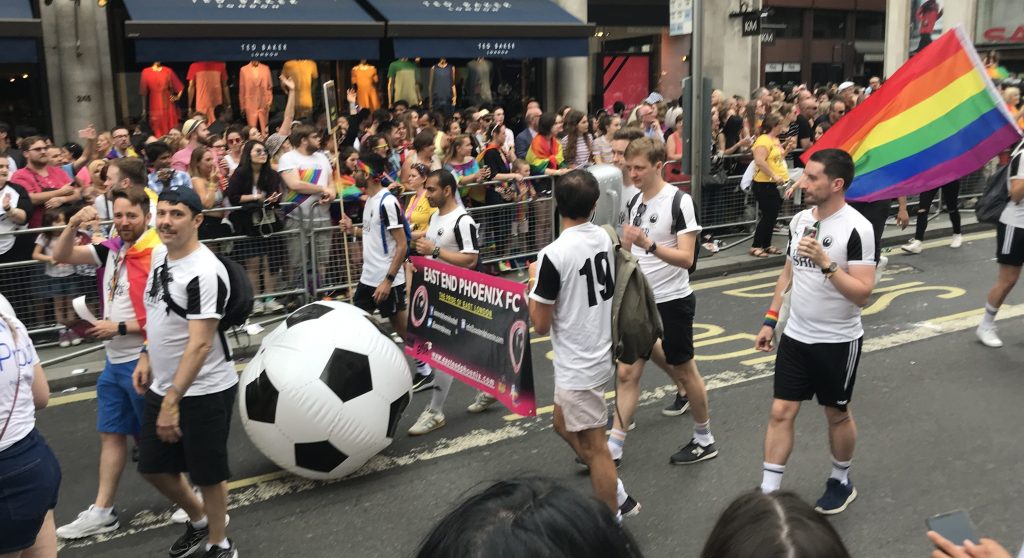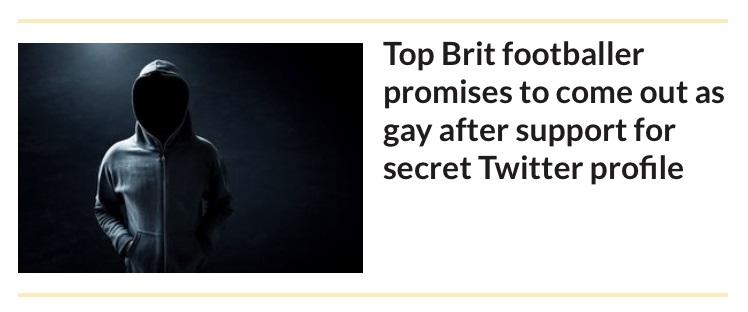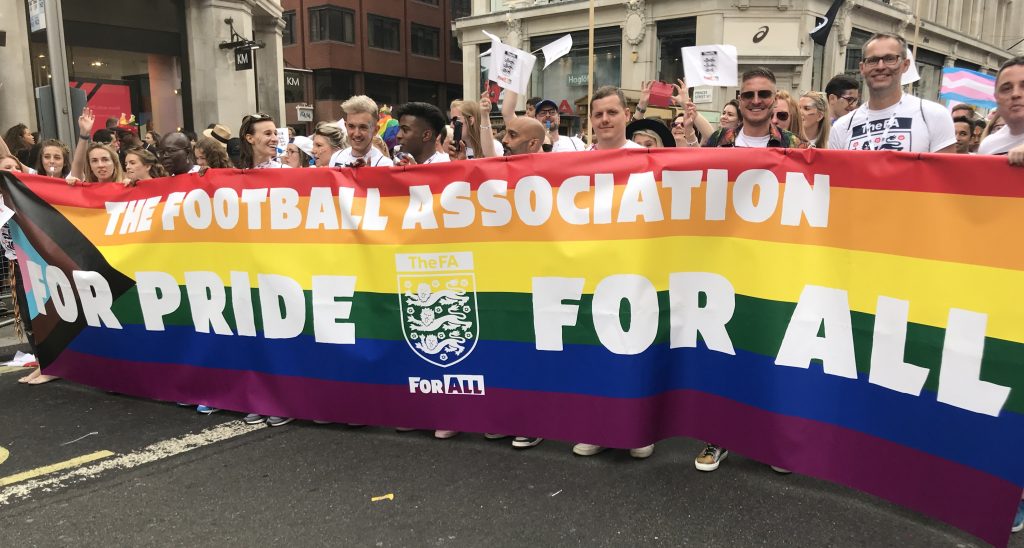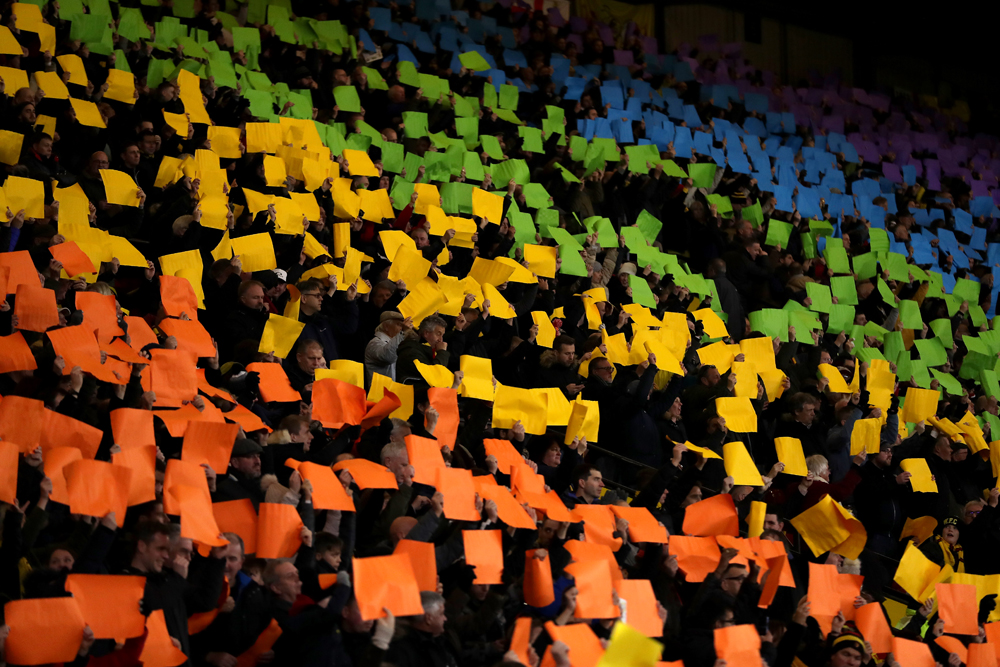How to help a gay footballer
The general goodwill at the prospect of a male professional footballer coming out publicly is heartening. The media must channel that positivity constructively, writes Jon Holmes, a senior editor at Sky Sports and the founder and lead of industry network and advocacy group Sports Media LGBT+…

On the Friday before Pride in London weekend, I became aware of a newly-created Twitter account called ‘The Gay Footballer’.
Since then, the account has amassed over 30,000 followers and has been the subject of various articles in the media and discussions on talk radio.
Looking at reactions, replies and quote-tweets interacting with the account, it’s clear to see considerable positivity at what is being teased – the prospect of a male professional footballer in the UK coming out publicly as gay. This would constitute a milestone moment in British football and accordingly, its news value would be high. Whatever your view on such stories, human curiosity plus the power of ‘the first’ combines to drive interest in both the scenario and the identity of the individual, who quickly becomes a role model to many people.
We’ve also just witnessed the UK’s biggest-ever Pride event and a Women’s World Cup in which the visibility and representation of lesbian, gay and bisexual players was strong. The person running this new Twitter account is certainly wise to this significance – one image posted to the account, with ‘Love is Love’ repeated in rainbow colours, was tweet-tagged to every major UK news organisation.

Within 24 hours, stories referencing the account’s tweets had run on the websites of Mail Online, the Independent, the Sun and the Daily Star, and also on the wires of the Press Association. The Indy’s headline on their version of the PA story was ‘Championship footballer to come out as gay after telling club manager and chairman’. A closer look at the SEO shows the keywords used were ‘championship-gay-footballer-twitter-account-come-out-who-is-it-when’, employing a common digital publisher tactic to tap into expected search terms and thereby generate additional traffic.
The tone of the article itself was more measured, referencing “claims” and using the word “purported”. The Star ran a story on page 5 of the paper on Monday with a silhouette of a ‘mystery player’; talkSPORT have devoted airtime to the topic and related themes in at least four of their shows in recent days; and it’s been covered by Wales Online, the Irish Examiner, local newspaper sites and many LGBT-specific media outlets too.

As a network of people working in the sports media industry who are LGBT+ and who are allies, it won’t surprise you to learn that we’ve been monitoring this coverage – many of our members have been asked about the account and the way it’s being reported. Collectively, we are heartened to see the strong support and general feeling of goodwill from football fans, others connected to the game, and from the media. We firmly believe it’s healthy to talk constructively about being gay in football, when it’s relevant to do so and in a way that helps more people fall in love with the game. Twitter can certainly be a great conversation starter, and this has kicked off some worthwhile discussions.
Sadly, there have also been some abusive interactions; one threatening tweet was highlighted by the account user as an explanation of the need for ‘careful handling’ of his situation. In addition, imitation accounts have been created; there has been evidence of some users photoshopping tweets and profiles, in attempts to mislead; and various other instances of mischief-making. @FootballerGay has also acknowledged “the scepticism” which many have expressed. All these factors have created a web of intrigue and as Sunday approaches – a pinned statement says that another meeting between club and player will be held on July 14 – there is an ever-growing sense of anticipation surrounding the account, which is itself following over 1,000 other users.

It’s a different approach to that taken by the Minnesota United footballer Collin Martin a year ago. The midfielder used his pre-existing social media accounts to say that he’d been out to his friends, family and MLS team-mates for years and seeing the way in which US soccer had embraced the spirit of Pride, he felt ready to share his truth. The role his team-mates played was particularly important. In an interview with the Daily Telegraph‘s Sam Wallace last November, Martin said:
I didn’t think it [coming out] was that big of a deal. That was my whole point. I had been accepted by all the people that mattered to me. I had been loved by my family and friends. That’s all I can ever remember – just being loved and supported by them.
Collin Martin
This chimes with the former NBA player turned psychologist John Amaechi’s explanation on the Homo Sapiens podcast a few months ago; that the act of coming out is a “profound statement” about the people around you.
When you reveal stuff that’s about you to other people, especially about your identity, people mistake it as a statement about the individual disclosing – and it’s not. When you come out to somebody, it’s a statement about the person you’re disclosing it to.
John Amaechi
Whatever the manner in which someone who is LGBT+ comes out, it is an intensely personal process – and a narrative which the individual concerned wants to retain control over. The @FootballerGay account knows this, having replied to a query about their unconventional social media strategy by saying that they still needed to contact certain others – “family, friends and those at my club” – who had not yet been brought up to speed. For our network members, and also others in our wider sports community who are LGBT, the common theme is a gradual sharing of information with those we trust most, and then more widely in our professional and sometimes public spheres. This process gave each of us the opportunity to build our self-confidence, and own that part of our identity which we had previously grappled with in secret.

Two years ago, I worked with the referee Ryan Atkin on an interview for Sky Sports in which he talked about his experiences of being a gay man working in professional football. Ryan had initially got in touch with me as a result of seeing our support for Stonewall’s Rainbow Laces campaign and the way we were communicating that support to a mass sports audience through our content. For Ryan, it was important to build collective trust offline first – there were private meetings with the FA, the Premier League, referees’ organisations, Stonewall, and others – before then presenting his story on his own terms, and discussing both that and wider LGBT+ themes with the media.
He’s since become a respected ambassador for inclusion in football and a Stonewall Sports Champion; a personality in football with a message of authenticity. By liberating himself from any worries over having to keep secrets, and by giving full focus to his duties on the pitch, he has created circumstances which have helped improve his performance as an official. His mental health is better, and he enjoys the game more. After being assessed in the same way as every other referee, his grades demonstrated this and he has subsequently been promoted up the referees’ ladder for the forthcoming season.
By coming out in the way they did, without build-up, both Ryan and Collin Martin ensured speculation over sexuality didn’t affect anyone else in the game. They spoke only to their own personal situations, and have continued to do so. Rumours over who is or isn’t gay or bisexual in men’s football are potentially harmful, and some players who fall into the league and age group now being discussed as a result of recent tweets may already have been affected negatively as a result. When media coverage fuels this speculation, there can be unforeseen consequences, particularly for young men who are already under intense pressure and scrutiny. The Daily Mail‘s Adam Crafton addressed this directly on the Sunday Supplement show on Sky Sports during last year’s Rainbow Laces activation period, stressing that the goal of creating an environment in which “people feel comfortable to be themselves” is in danger of being missed due to an obsessive distraction over who may or may not be gay.

The priority for journalists and editors in telling any story must always be to find evidence and corroboration – we have a responsibility to our readers, viewers and listeners, and to the truth. Often on LGBT+ representation, this is difficult to navigate, particularly when social media is involved. Take the case of James Faulkner, the Australian cricketer who appeared to be coming out via Instagram in late April by hashtagging the word ‘boyfriend’ into a post that quickly garnered welcoming reactions from team-mates past and present, before being reported on worldwide. It then transpired that Faulkner was being perhaps playful, possibly provocative; cricketers in the replies were either in on the ‘joke’, or taken in like so many others; and even though Faulkner later thanked the LGBT community and allies for being supportive amid all the misunderstanding, there was a prevailing sense of disappointment that this was yet again the connection between being gay and men’s pro team sports – a mis-step, a false narrative, a fiction.
What is both known and which warrants further coverage is the work being done by organisations to address any lingering disconnect or discrimination in sports for LGBT people. The FA and the ECB marched in the Pride in London parade last weekend, and spoke about how that fitted into their broader ‘For All’ inclusion work; the Premier League shares the Rainbow Laces message to ‘make sport everyone’s game’ more widely each year, including to parts of the world where LGBT+ rights are nowhere near to being won; campaigns and initiatives by Football v Homophobia, Pride in Football (the UK network of LGBT+ fan groups) and Just A Ball Game? are making those ‘difficult conversations’ far easier; and across the country, sports clubs and teams that proudly state they are LGBT-inclusive are ensuring more people have access to sport, alleviating a variety of concerns that may be related to sexuality or gender identity.

As a network, we urge any fellow media professional who wants to report upon a male footballer possibly coming out publicly to recognise the complexities of such a story, and appreciate too that such an act – liberating for the player, empowering for many others – would only be one part of a bigger puzzle. The key to unlocking a more inclusive culture for everyone in football long term does not lie in the hands of a mystery individual, however impactful their moment ultimately proves to be, whether it happens this month by way of Twitter or in the future. We discussed these concerns with our peers at a media Rainbow Laces round-table convened by Stonewall and the Premier League in May 2018, and we would welcome the opportunity to talk further with anyone from our industry or from related sectors on the topic.
Towards the end of the pinned statement on the @FootballerGay account, the user writes of how he needs to “have taken the time to give full consideration to how and when” his story will be shared. It’s in everyone’s best interests if all those following on social – and particularly those in newsrooms – follow the same advice, and think carefully about the effects of their output.
Reflecting more recently in a new interview for the MLS ‘Soccer for All’ campaign, Martin said his coming out as a gay footballer wasn’t for himself, but for others who “were maybe unsure of their sexuality”. Only by having that surety in his own identity could he feel empowered to share it with others who would benefit from his visibility, and help them find their own place. Whether you are LGBT or not, we can all help to create a climate in British football where we are supportive but not speculative – the same allyship which Collin Martin could sense in MLS when he hit ‘Tweet’ on his rainbow-flag-wrapped picture and statement 12 months ago.
You can follow Jon at @jonboy79 on Twitter, and Sports Media LGBT+ on Twitter, Instagram and Facebook. Want to connect with our network? Please get in touch.
Further reading…
‘Football United’ match to be held at Whitehawk FC on August 4


